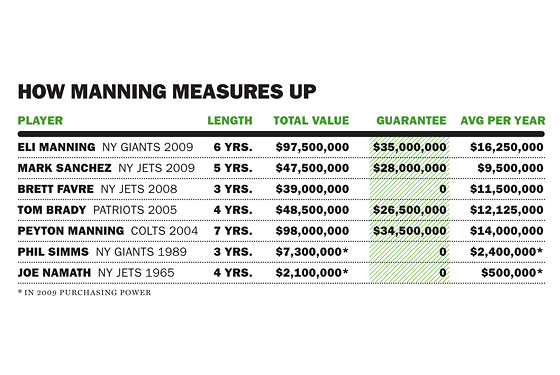
Remember when we didn’t like to talk about money in sports? When how much athletes were paid, and how much cash franchises raked in, was considered a dirty pox on the game? When we resented spoiled athletes and greedy owners for turning the sports fan upside down and shaking him until every last quarter was jarred loose from every orifice?
Okay, so maybe we still do that. But over the last few years, something in sports has slowly, subtly changed. We’ve started to see money not as an unspeakable offshoot of our great games but an actual indicator of athletic value, and as worthy of discussion as batting averages and passing efficiency. It has affected everything. Our perception of individuals: Luis Castillo is a below-average second-baseman, but add in his insane four-year, $25 million contract, and he turns into a Flushing tragedy. The realism of our expectations: We might want Matt Holliday in the Citi Field outfield, but, man, not at that price. We value athletes, in part, by how much money they make.

Which brings us to Eli Manning. The Giants, to much fanfare, signed the charmingly yokelish Giants quarterback to a six-year, $97.5 million contract extension last month, which, on its surface, made him the highest-paid quarterback ever. The yearly average value of the extension, $16.25 million, is the highest for anybody in NFL history. This raised considerable eyebrows around the NFL because, well, let’s see, what’s the best way to say this … the notion that Eli Manning is the best quarterback in his immediate family, let alone the best quarterback in NFL history, is something that no one has ever argued, probably not even Eli himself. They’re making him the highest-paid player in the history of the NFL? The whole history?
But that’s not what the Giants were doing. NFL contracts are famously complicated and intricate, and highly prone to being ripped up and undone (to the team’s benefit, not the player’s). The total value of the contract might be the most for a quarterback in NFL history, but it’s extremely rare that NFL contracts of that length actually make it to completion. That is to say, much of this contract extension was a public-relations move. And in the opposite direction you’d think. Typically, major corporations, particularly in today’s wintry economic climate, emphasize the cutting of costs. That’s not what the Giants did. The Giants are using the contract to broadcast to the world, and to Eli personally, that they believe in him.
But the fine print says something else.
J. I. Halsell is a former salary-cap analyst for the Washington Redskins and is considered one of the few trusted experts on the arcane rabbit hole that is NFL finance. He was not fooled by Eli’s contract at all.
“Much like anything else with numbers, you can kind of twist statistics so that they kind of meet your agenda,” Halsell says. “I can highlight the total value of the contract and say, ‘Yeah, I got my guy a $120 million contract.’ But if he’s realistically only going to make $40 million of it, then, is it really a $120 million contract? Not really.”
First and foremost, it’s important to understand how football contracts are different from baseball and NBA contracts. The key is “guaranteed money.” Of that $97.5 million extension for Manning, only $35 million of it is guaranteed. If Mark Teixeira forgets how to hit a baseball or is hit by a bus tomorrow, he’ll still be paid every penny of the $180 million he’s owed through the 2016 season. If Eli Manning falls off the map—or at least never improves to become truly one of the NFL’s top quarterbacks—the Giants can be rid of him in three years at a cost of only $35 million. A hunk of change, obviously. But it’s not $95 million.
Which means, if the Giants really wanted to, according to Halsell, they could have said, “Eli Manning has been signed for 25 years, at $750 billion.” It only matters what the guarantee is.
It’s also worth remembering that Manning’s contract was an extension, rather than a brand-new contract altogether. (This is another reason he’s unlikely to finish out this full contract; if he’s playing well as it nears the end, they’ll just do another extension.) Which means that restructuring the deal allowed them to futz with this season’s salary cap. Giving Manning this “massive” deal, as it turns out, actually lessened the team’s cap hit this season. In the backward planet of NFL contracts, a $97.5 million extension gave the team more money to play with this year.
Here’s how it works. Before the extension, Manning’s 2009 contract counted for $9.4 million in salary and $1.5 million in incentives in ’09, which, when added to proration, made his 2009 cap number $13.86 million. When they extended the contract, they made this season’s salary $7.5 million, and then knocked those incentives off the books because they weren’t included in the new deal. That vanished money is less than the $2.6 million prorated-for-2009 amount of Manning’s signing bonus … $800,000 less, to be exact. So, by giving Manning an extension with a redone contract, they have $800,000 to spend on players (or do whatever) this season that they wouldn’t have otherwise.

Even when you compare Manning’s contract with other current quarterback contracts, peers like Pittsburgh’s Ben Roethlisberger and San Diego’s Philip Rivers, it looks less like an otherworldly contract and more just like the Going Rate. Rivers is making more guaranteed money than Manning ($38,150,000), and as a total for the first three years of the contract (which Halsell uses as a barometer for likely contract value, considering how few contracts make it all the way to the end), Roethlisberger outpaces Manning $52,686,501 to $50,850,000.
The main reason for the Giants’ loud trumpeting of the contract has been the notion that they are tying their future to Manning’s, that they will rise and fall on his success or failure. But that’s not true either. If Manning were to crap out this season, the Giants couldn’t cut him because they’d take too much of a hit. But by seasons two and three? “If you cut him in either one of those years, the amount of proration that’s going to come into those years, the penalty that you’re going to pay for cutting him is not going to be equal to or more than what his cap number was going to be anyway,” Halsell says. “So if you cut him after, in 2011, you actually save yourself some money. So they’re not going to be struggling to make that decision, if they have to go that route.”
Manning ranked fourteenth in the NFL last season in pass efficiency, seventeenth in yards, and tenth in touchdowns. Those are far less impressive numbers than “first in salary.” He might not look like the best quarterback in football, but they pretend he’s paid like one. They plan for the illusion to hold. At least for the next two or three years.
And in a way, it’s a smart move. Manning has played well so far, and there’s something winningly old-school about it, a harking back to the time when people truly put their money—or at least their public money—behind their convictions. Only time will tell if the Giants’ confidence will pay off … or if it’s another case of irrational exuberance.
